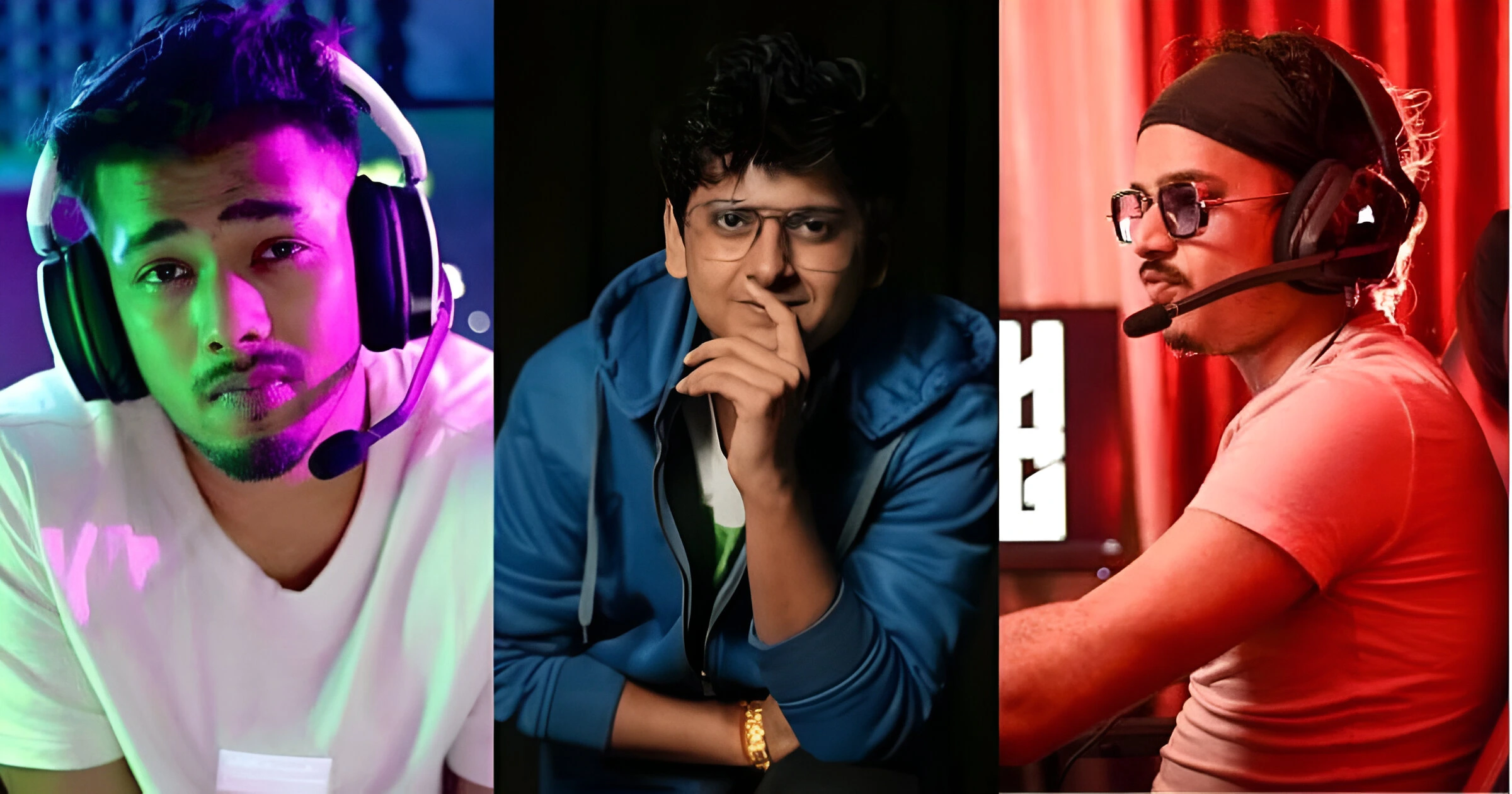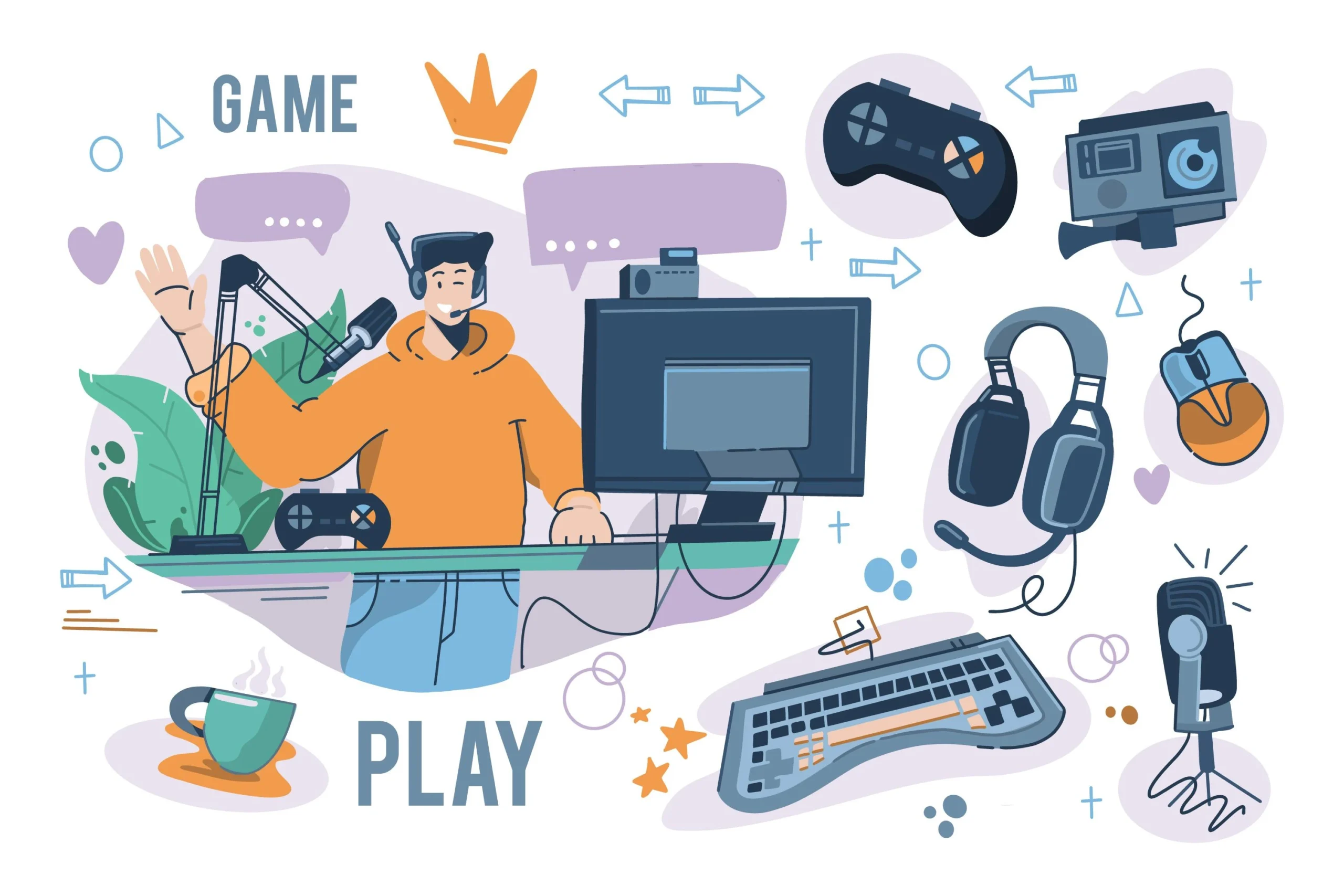The world of gaming has undergone a revolutionary transformation over the last decade, turning from a niche hobby into a multi-billion-dollar global industry. In 2025, it is not just a pastime; it’s a serious career path. For many, the thought of pursuing gaming professionally may seem unconventional, but success stories of individuals like Naman “Mortal” Mathur, Tanmay “Scout” Singh, and international icons like Tyler “Ninja” Blevins prove that this industry holds immense potential.
In this blog by adwebcraft, we’ll dive into why a gaming career is worth it in 2025. From lucrative opportunities to life-changing success stories, this article explores the scope, challenges, and undeniable rewards of a career in such unique and wanted field.
Gaming as a Viable Career in 2025
Gone are the days when it was simply a recreational activity. The gaming industry in 2025 is expected to exceed $300 billion in revenue globally, thanks to advancements in technology, internet penetration, and the rising popularity of esports and streaming platforms. With platforms like YouTube, Twitch, and Facebook, gamers are hosting millions of creators and tournaments offering prize pools in the millions, it is now recognized as a legitimate profession.
The industry isn’t limited to playing video games professionally. It spans a wide array of opportunities, including:
1. Content creation (streaming and videos)
Content creation has become one of the most lucrative career paths in gaming, with platforms like YouTube, Twitch, and Facebook supports it by enabling gamers to monetize their passion. Streamers and video creators build their audience by sharing gameplay, tutorials, reviews, and live interactions, often earning through ads, sponsorships, donations, and subscription models. The rise of short-form content on TikTok and Instagram Reels has also opened new opportunities, allowing creators to reach wider audiences and engage viewers with quick, engaging clips. Successful content creators often develop a personal brand, collaborating with gaming companies, promoting products, and even launching their own merchandise.
In 2025, such content creation will continue to evolve with advancements in AI, virtual production, and interactive streaming. AI-driven content suggestions and real-time engagement analytics will help creators refine their strategies and maximize viewer retention. Additionally, the introduction of new monetization features, such as blockchain-based tipping and NFTs, will provide fresh revenue streams. As competition increases, aspiring creators will need to focus on niche content, community building, and high production quality to stand out. The ability to adapt to emerging trends and integrate cutting-edge technologies will be crucial for long-term success in this ever-growing industry.
2. Esports athletes
Esports has transformed from a niche hobby into a billion-dollar industry, with professional gamers competing in global tournaments for massive prize pools. Games like League of Legends, Dota 2, Valorant, and Counter-Strike: Global Offensive have established organized leagues, attracting sponsorships from major brands such as Red Bull, Intel, and Nike. Esports athletes dedicate years to mastering their skills, training for hours daily, and working with coaches, analysts, and psychologists to maintain peak performance. The ecosystem supports full-time careers, with salaries, prize money, and endorsement deals providing financial stability for top players.
In 2025, esports is expected to further integrate with mainstream sports, with universities offering scholarships for esports programs and traditional sports franchises investing in gaming teams. The growing acceptance of esports in the Olympic movement and the development of VR-based competitive games will also expand career opportunities. However, the career lifespan of an esports athlete remains short due to the high-pressure environment and rapid skill deterioration with age. As a result, players are increasingly focusing on long-term career planning, transitioning into coaching, content creation, or game analysis after their competitive years.
3. Game development and programming
Game development is at the core of the gaming industry, encompassing everything from designing immersive worlds to coding complex mechanics. Developers work in various roles, including game design, programming, animation, and audio engineering, contributing to the creation of indie games and AAA titles alike. The demand for skilled programmers continues to rise, with game engines like Unity and Unreal Engine simplifying the development process and enabling aspiring developers to create their own projects. With the increasing adoption of AI and procedural generation, developers can now create more dynamic and personalized gaming experiences.
By 2025, game development will be more accessible due to improved no-code and low-code tools, allowing even those without formal programming skills to design and publish games. The rise of Web3 and blockchain gaming will introduce new monetization models, including play-to-earn mechanics and digital ownership of in-game assets. Additionally, the integration of AR and VR technologies will drive innovation in immersive gaming experiences. While opportunities in the industry are vast, competition is intense, requiring developers to stay updated with the latest technologies and continuously refine their skills to remain relevant in the evolving market.
4. Gaming journalism
Here, journalism plays a crucial role in shaping industry discourse by providing news, reviews, interviews, and investigative reports on gaming trends. Journalists work for major gaming websites, magazines, and independent platforms, covering everything from game launches and industry controversies to deep dives into such culture. The rise of digital media has enabled journalists in this field to build personal brands through blogs, YouTube channels, and podcasts, expanding their influence beyond traditional print and online publications.
In 2025, this journalism will continue to adapt to changing audience preferences, with an increasing emphasis on video content, interactive articles, and AI-driven news aggregation. As the this industry becomes more commercialized, maintaining journalistic integrity and unbiased reporting will be critical. The rise of community-driven journalism, where players actively participate in reporting and discussion, will challenge traditional media outlets. With gaming companies becoming more involved in PR-controlled narratives, independent journalism will be vital in ensuring transparency, ethical reporting, and holding the industry accountable for its practices.
5. Event management for esports
One key factor driving this growth is the community aspect of gaming. Popular gamers like Mortal and Scout have built massive online communities that drive engagement, sponsorship deals, and collaborations.
Success Stories of Top Gamers

Naman “Mortal” Mathur
He is a household name in Indian esports. Rising to fame with PUBG Mobile, Mortal is now a co-owner of the organization S8UL and continues to inspire millions. He began as a casual gamer but became a sensation due to his skill, consistency, and humility. Mortal’s rise highlights the power of hard work, team spirit, and a focus on mental health in esports.
In addition to winning major tournaments, Mortal has partnered with brands like OnePlus and has a loyal fan base of over 7 million subscribers on YouTube. His career shows how gamers can diversify their income through brand endorsements, content creation, and business ventures.
Tanmay “Scout” Singh
Tanmay Singh, popularly known as “Scout,” is another icon in the Indian gaming world. Known for his aggressive gameplay and strategy, Scout is an international-level player who represented India in tournaments worldwide.
What sets Scout apart is his perseverance. Despite facing criticism and setbacks early in his career, he never gave up and went on to become a leader in the gaming community. His journey inspires young gamers to stay resilient and chase their dreams.
Tyler “Ninja” Blevins
Tyler “Ninja” Blevins is a global phenomenon and one of the richest gamers in the world. His Fortnite streams attracted millions, and his transition to platforms like Mixer and YouTube showcased the versatility required in the gaming space.
Ninja has collaborated with major brands like Adidas and Red Bull, earning millions in sponsorships. His story underscores the limitless financial opportunities available in the gaming world when combined with a strong personal brand.
Animesh “Thug” Agarwal
Animesh “Thug” Agarwal is a name synonymous with gaming entrepreneurship. A former esports player, Thug co-founded S8UL, an organization that has redefined the gaming ecosystem in India. His story emphasizes how gamers can transition into business, creating sustainable income streams for themselves and their communities.
Gaming Organizations Shaping the Industry
S8UL
S8UL is one of India’s most prominent gaming organizations, bringing together professional esports, content creation, and community engagement under one umbrella. Formed by the merger of Team SouL and 8Bit, two legendary gaming brands in India, S8UL was co-founded by Naman “Mortal” Mathur, Animesh “Thug” Agarwal, and Lokesh “Goldy” Jain. The organization has established itself as a powerhouse in mobile and PC esports, competing in games like Battlegrounds Mobile India (BGMI), Valorant, and Pokemon Unite. S8UL has dominated major Indian and international tournaments, securing brand partnerships and sponsorships with companies like Krafton, Logitech, and Red Bull.
Beyond esports, S8UL has significantly influenced India’s gaming culture through its massive content creation ecosystem. With top gaming influencers, streamers, and professional players producing engaging content on YouTube, Instagram, and Discord, the organization has amassed millions of followers. Their dedicated S8UL Gaming House acts as a hub for innovation, collaboration, and mentorship, inspiring young gamers to pursue professional gaming careers. Recognized as one of the top gaming content organizations globally, S8UL continues to elevate Indian gaming to new heights, setting the foundation for the country’s growing esports industry.
Under S8UL, gamers receive training, sponsorship opportunities, and a platform to reach global audiences. The organization has won awards for its efforts in professionalizing gaming in India and is a prime example of how gaming organizations are driving the industry forward.
FaZe Clan
FaZe Clan is a leading esports and entertainment organization, known for its dominance in competitive gaming and content creation. Founded in 2010 as a Call of Duty sniping clan, it has expanded into multiple esports titles like CS:GO, Valorant, and Fortnite. Beyond gaming, FaZe has built a massive brand, blending esports with fashion, music, and mainstream entertainment, partnering with companies like Nike and McDonald’s.
By 2025, FaZe Clan remains a major force in gaming culture, despite facing financial and leadership challenges. It continues to innovate through collaborations, Web3 projects, and digital entertainment. However, with growing competition, FaZe must evolve its strategy to stay relevant, whether through esports success, content expansion, or new entertainment ventures.
TSM (Team SoloMid)
Team SoloMid (TSM) is a renowned esports organization founded in 2009 by Andy “Reginald” Dinh, initially as a League of Legends team. Over the years, TSM expanded into games like Valorant, Apex Legends, and Fortnite, winning multiple championships and building a massive global fanbase. Their dominance in the LCS and strong recruitment of top-tier players have solidified their position as one of North America’s most successful esports teams.
Beyond competition, TSM has grown into a major gaming brand, securing sponsorships with companies like Logitech and Lenovo. Their focus on content creation, including vlogs and social media engagement, has strengthened their presence in the gaming community. In 2023, TSM exited the LCS, shifting toward international expansion and broader competitive ambitions, ensuring their continued influence in the esports industry.
The Financial Scope of Gaming Careers
The worth of a career in gaming goes beyond fame and recognition—it’s also highly lucrative. Professional gamers can earn from several sources:
- Tournament Winnings: With prize pools reaching up to $40 million, tournaments offer significant financial rewards.
- Sponsorships and Endorsements: Brands like Logitech, Alienware, and Monster Energy actively seek partnerships with gamers.
- Streaming Revenue: Platforms like Twitch and YouTube provide opportunities for ad revenue, subscriptions, and donations.
- Merchandising: Gamers often launch their own merchandise lines, ranging from apparel to gaming accessories.

Skills Required for a Career in Gaming
Pursuing a career in gaming isn’t just about playing video games. It demands a mix of technical skills, mental fortitude, and business acumen. Key skills include:
- Game Mechanics Mastery: Understanding the intricacies of specific games.
- Strategic Thinking: Analyzing and adapting gameplay strategies.
- Communication: Building a community through effective communication and interaction.
- Endurance and Focus: Managing long hours of practice and tournaments.
Challenges in the Gaming Industry
Despite the opportunities, the gaming world isn’t all fun and games. Aspiring gamers face challenges like:
- Burnout: Prolonged hours of gameplay can lead to mental and physical exhaustion.
- Competition: The field is highly competitive, with thousands vying for limited opportunities.
- Income Stability: Early in their careers, gamers often struggle with consistent earnings.
Organizations like S8UL and FaZe Clan, however, are actively working to provide mental health support and career guidance to players, mitigating these challenges.


